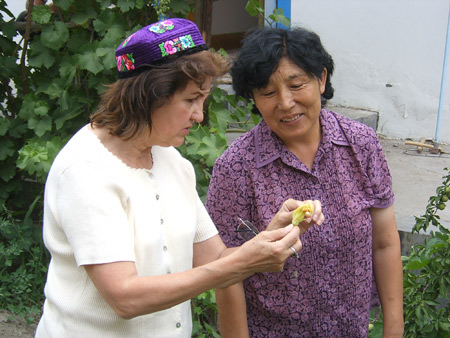By Lisa Carducci
Jiang'er•Rehati lives in northeast Xinjiang, at Fuhai (Burultokay) in Altay Prefecture. I arrived at her place from Burqin on a Sunday morning; she expected me at the entrance of the modest courtyard to her nice, large, and comfortable house. As in all the Kazak houses I visited, I noticed the presence of lovely carpets in each room. Jiang'er stopped me from taking off my shoes. In fact, she had taken the precaution of rolling up the living room carpet. Underneath, white ceramic tiles looked easy to clean.
Born in Manas, Changji Hui Autonomous Prefecture, Jiang'er is the eldest of four children. She has a sister and two brothers, of whom one is a professor, and the other two, office cadres. When Jiang'er was a child, her family came to live in Fuhai, and in 1986 returned to Manas. She remained.
|

|
|
Lisa(L) and Jiang'er(R) [Foreign Languages Press]
|
Jiang'er looked tired, and for good reason. Two hours earlier, she had just returned from a four-day meeting in Urumqi. It was a preparatory meeting for the 17th National Congress of the Communist Party in October. Jiang'er was recently elected to participate in it, and her term will last five years. As soon as she passed through the door of her home, Jiang'er started to patiently answer the phone. She even made calls during our interview.
I had heard she was a midwife, and though her career began in this manner, Jiang'er later became a gynecologist and obstetrician. After graduating from high school in 1970, Jiang'er was sent to a hospital to work as a nurse. As was the case of many Chinese people who started working at that time – during the "cultural revolution" – Jiang'er learned her specialty in the field. One day, she was home when the time came for their neighbor to give birth. She and her mother went to help in the difficult, risky delivery. Jiang'er's mother left to get a doctor while the 16-year-old girl remained with the pregnant woman, who was sweating, crying, and screaming. Before the doctor could arrive, the pregnant woman had given birth to a dead baby. Jiang'er thought, 'If I were a doctor, I could have saved the baby.' Thus, the door to her destiny had just opened, and the student registered with Urumqi Institute of Medicine. Years later, she left with a diploma in her hands.
Jiang'er recounted a story about her career to me. It was in May 1980. One day when she was alone at the hospital, she heard someone calling her and she ran toward the voice, but before she could take the mother-to-be to a decent room, the woman ended up delivering the baby in the hallway. The baby's mouth was full of the mother's excrement and it was suffocating. In front of the father's horrified expression and without hesitation – and ignoring her own disgust – she practiced mouth-to-mouth resuscitation on the baby. The mother and the newborn survived.
As Chinese is not Jiang'er's native language and neither is mine, we sometimes misunderstood each other. So when I asked her how many children she has "delivered," she answered, "Only one, a girl," pointing to a young woman's photo, a graduate in computer science who works at the Urumqi Renmin Hospital. I phrased the same question differently and obtained a different answer: this time, the huge number of 6,000 babies in 36 years. The gynecologist worked at the Fuhai Renmin Hospital where six gynecologists served, until she was assigned to the Mother and Child Health Centre, which is also in Fuhai. The time is long gone when women gave birth at home, and since 2000, Fuhai is no longer on the list of the poorest counties.